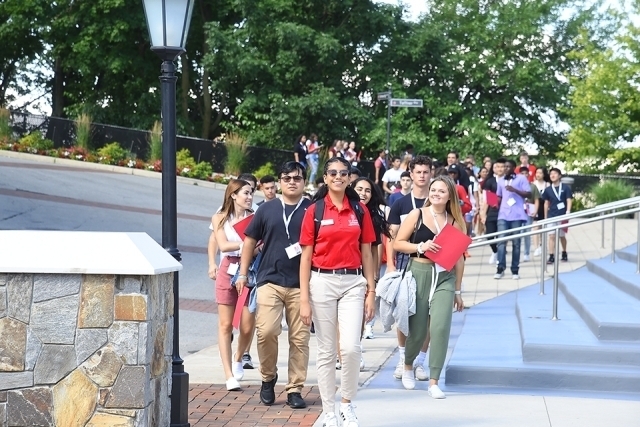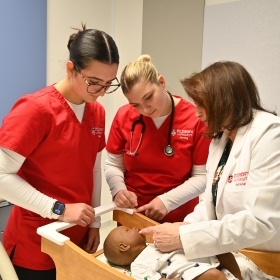Your Guide to Prepare for New Student Orientation

You’ve completed the application process and secured a spot at your dream university. The next chapter of college life is about to begin—but before classes start and you fully immerse yourself in campus life, attending a new student orientation is crucial.
Learn about the benefits of attending, what to anticipate, and how you should prepare before orientation day.
What is a New Student Orientation?
Think of orientation as a crash course in becoming a college student. It’s a jam-packed day (or up to a week, depending on your college or university) to enable success as you begin your academic journey.
The Importance of Attending Orientation
Attending your first-year college or university orientation offers numerous benefits beyond seeing the campus itself. Here are four essential reasons why participating in orientation is crucial for incoming students:
It sets you up for academic success.
Orientation sessions typically cover essential topics like course registration, getting to know the campus layout, and navigating online tools you may use throughout college. Understanding these key aspects will give you a head start ahead of your first semester.
Connect with students.
One of the biggest anxieties for incoming college students is making friends. Orientation provides a fantastic platform to meet classmates, upperclass students, and resident advisers in a relaxed setting. You might even form study groups or friend circles that last throughout your college years.
Learn about campus resources.
Colleges and universities provide various resources for student success, such as mental health counseling and career services. Many also offer resources specifically designed for incoming first-year students. During orientation, you will be introduced to all the valuable tools available and learn how to access them when needed.
Get to know campus life.
Orientation is a great way to get a sense of the college or university’s unique culture and rich traditions and determine whether it fits you.
Registering for first-year orientation at St. John’s University? All incoming students can find instructions here.
Pre-Orientation Checklist: 7 Essential Tasks for Incoming College Students
Before you dive into the excitement of first-year orientation, here are a few essential tasks your college or university may need you to take to ensure a smooth transition into college life. Here’s a comprehensive preorientation checklist [AG2] to help you get started:
Submit Your Final Transcripts.
Ensure your high school sends your final transcript to your college’s admission office. Double-check that any advanced placement, International Baccalaureate, or dual-enrollment credits have been received and processed.
Set Up Your College Email Account.
Activate your college email account and check it regularly for important information and updates. Familiarize yourself with the college or university’s email system and other online platforms.
Complete the Required Health Forms and Immunizations.
Submit all necessary health forms, including immunization records. Additionally, schedule any required medical exams or vaccinations before orientation.
Pay Your Tuition Deposit.
Secure your spot in the incoming class by paying your tuition deposit. Review the payment schedule and plan for upcoming tuition and fees to avoid financial surprises.
Sign Up for Housing (If Applicable).
Complete your housing application and submit any required deposits. Take some time to review the housing options and select your preferences to find the best fit for you.
Register for Placement Tests (If Applicable).
Sign up for any required placement tests in subjects like math, writing, or foreign languages.
Prepare the Necessary Documentation.
Gather essential documents such as a government-issued ID, Social Security card, and health insurance information.
Orientation Schedule and Activities
During orientation day, enthusiasm and positivity are abundant, along with a packed schedule of events in which to participate. The orientation structure and activities can differ based on your college or university. Nonetheless, typically included are common activities such as
- Welcome Sessions: University leaders and faculty welcome you to the institution and share their vision for your academic journey. During these sessions, you may also learn about the college/university mission.
- Academic Advising: You’ll likely meet with your academic adviser or a representative from your chosen major. This session is an excellent opportunity to discuss course selection and future educational goals.
- Campus tour: Get to know your new stomping ground! These tours show you key buildings, such as classrooms, libraries, dorms, and recreational facilities.
- Resource Fairs: Meet representatives from departments such as financial aid, career services, student health, and student clubs.
- Social Events & Activities: Participate in icebreakers and social gatherings to form connections.
Additional Frequently Asked Questions
Is Orientation Mandatory?
While some universities might make orientation optional, it’s highly recommended that you attend. Orientation programs are packed with valuable information that prepares you for success throughout your academic career. Think of it as an investment—the time you dedicate to orientation will save you countless hours of confusion and frustration later.
Do parents attend student orientation?
Student orientation is specifically designed for you, the student. However, some colleges and universities also organize separate activities for parents who stay on campus during student orientation or host a separate family orientation. These sessions may cover financial aid options, campus support services, campus safety measures, Q&A sessions, and more.
Orientation Inside Look: St. John’s University in New York City
Are you curious to get a glimpse of what an orientation is really like in action?
Watch a recent summer orientation video created by the dedicated orientation leaders at St. John’s University to get a sneak peek behind the scenes.






